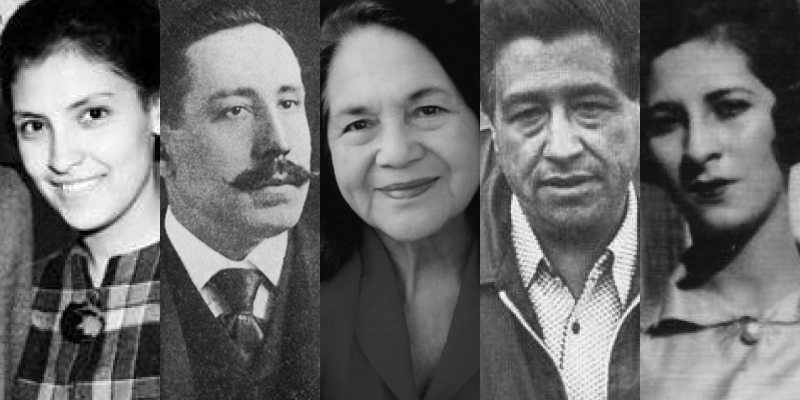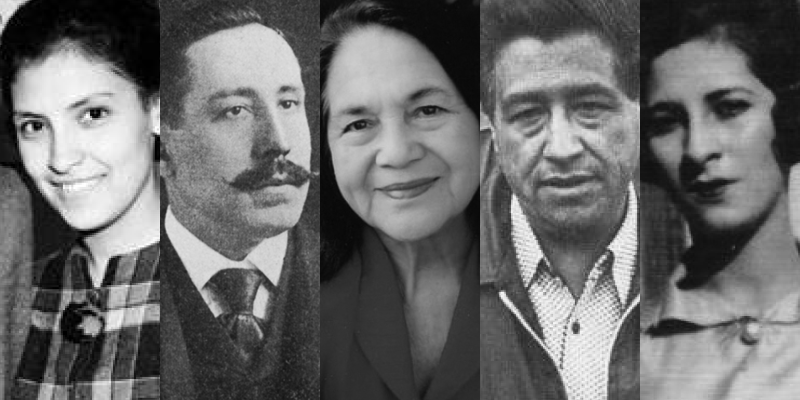
Hispanic workers have played an important role in the history of the nation and the labor movement. Here are five labor leaders who have made important contributions to work in America.
Cesar Chavez
One of the country’s most famous labor advocates, Cesar Chavez led the United Farm Workers of America. Embracing non-violent acts of civil disobedience, Chavez drew attention to discrimination and brought about policies that improved working and living conditions for farmworkers around the country. For Chavez, strikes and other forms of peaceful protest were tools for improving the lives of others. “The fight is never about grapes or lettuce. It is always about people,” he said.
Dolores Huerta
Dolores Huerta co-founded the National Farm Workers Association (later the United Farm Workers) with Cesar Chavez in 1962. Huerta directed a national grape boycott to protest the dangers of pesticides on grape pickers, which led the entire California table grape industry to adopt safer practices. She also negotiated the first collective bargaining agreement with an agricultural business to secure better wages and working conditions for farmworkers. Throughout her career, Huerta fought for world peace and the rights of immigrants, women, minorities, at-risk youth and LGBTQ+ Americans.
Santiago Iglesias Pantin
An outspoken advocate for workers’ social and economic wellbeing, Santiago Iglesias Pantin served as the American Federation of Labor’s organizer for Puerto Rico and Cuba at the start of the twentieth century. When the San Juan News accused him of violent agitation, Iglesias defended himself, saying, “My mission is most eminently American. For the organization of the working people, for their education, and for their liberty.” He was the resident commissioner of Puerto Rico from 1933 until his death in 1939, and his successor Bolivar Pagan described him as “the main voice heard in a 40-year fight to raise up conditions of labor, to make the common man be conscious of all the rights and privileges under American democratic institutions.”
Luisa Moreno
A passionate advocate for women and immigrant laborers’ rights, Luisa Moreno helped create a coalition of Latino labor rights activists in the 1930s. Moreno, who was born in Guatemala, organized New York garment district workers, Louisiana cane workers and Florida cigar rollers. She also helped found the National Congress of Spanish-Speaking Peoples, which advocated for integration and fair treatment of Latino laborers.
Emma Tenayuca
Mexican American labor organizer Emma Tenayuca participated in the 1933 walkout of women cigar workers, and later helped form two International Ladies' Garment Workers' Union locals. She also protested border patrol abuses, led demonstrations and strikes, and advocated for Mexican immigrant workers’ right to unionize without fear of deportation. In 1938, when Tenayuca was in her early twenties, she led a pecan shellers’ strike after factory owners sliced wages. The strike was one of the largest in U.S. history, and one of the first significant labor equity victories for Mexican Americans.
While they came from different background and worked in different industries, Chavez, Huerta, Iglesias, Moreno and Tenayuca all recognized that a fair day’s work deserves a fair day’s wages, and their sacrifices and leadership have contributed to safer, healthier, fairer working conditions for all of America’s workers.
Jeff Freund is the director of the U.S. Department of Labor’s Office of Labor-Management Standards.
5 Líderes Hispanos que Cambiaron la Historia del Trabajo
Por Jeffrey Freund

Los trabajadores hispanos han jugado un papel importante en la historia de la nación y del movimiento sindical. Estos son cinco líderes laborales que han hecho importantes contribuciones al trabajo en Estados Unidos.
César Chávez
Uno de los más célebres defensores de los trabajadores del país, Cesar Chávez lideró el sindicato Unión de Campesinos. Adoptando actos no violentos de desobediencia civil, Chávez llamó la atención sobre discriminación e impulsó políticas que mejoraron por todo el país el trabajo y las condiciones de vida de los trabajadores agrícolas. Para Chávez, las huelgas y otras formas de protesta pacífica fueron instrumentos para mejorar la vida de la gente. “La lucha nunca es sobre uvas o lechugas. Es siempre sobre personas”, dijo.
Dolores Huerta
Dolores Huerta cofundó la Asociación Nacional de Trabajadores Agrícolas (más tarde, Unión de Campesinos) con César Chávez en 1962. Huerta organizó una protesta nacional contra la uva para oponerse a los peligros de los pesticidas sobre los recolectores de uva. Esta protesta condujo a toda la industria de la uva de mesa de California a adoptar prácticas más seguras. Huerta también negoció el primer convenio colectivo con una empresa agrícola para lograr mejores salarios y condiciones laborales para trabajadores agrícolas. A lo largo de su carrera, Huerta luchó por la paz y los derechos de inmigrantes, mujeres, minorías, jóvenes en riesgo y estadounidenses LGBTQ+.
Santiago Iglesias Pantín
Firme defensor del bienestar social y económico de los trabajadores, Santiago Iglesias Pantín se desempeñó como organizador de la Federación Regional de Trabajadores de Puerto Rico y Cuba a principios del siglo 20. Cuando el San Juan News lo acusó de agitación violenta, Iglesias se defendió afirmando que “mi misión es eminentemente americana. Por la organización de la gente trabajadora, por su educación, y por su libertad”. Fue comisionado residente de Puerto Rico desde 1933 hasta su muerte en 1939, y su sucesor Bolívar Pagán lo describió como “la principal voz de una lucha de 40 años para alzar las condiciones laborales, para que el hombre común sea consciente de todos los derechos y privilegios otorgados por las instituciones democráticas Americanas”.
Luisa Moreno
Apasionada defensora de los derechos de la mujer y los trabajadores inmigrantes, Luisa Moreno ayudó en la década de 1930 a crear una coalición de activistas latinos por los derechos laborales. Moreno, que nació en Guatemala, organizó a trabajadores del distrito de la costura de Nueva York, a trabajadores de caña de Luisiana, y a los enrolladores de puros de Florida. Ella también ayudó a fundar el Congreso Nacional de Pueblos de Habla Española, que abogó por la integración y el trato justo de los trabajadores latinos.
Emma Tenayuca
La organizadora laboral mexicoamericana Emma Tenayuca participó en la huelga de 1933 de las trabajadoras de puros y más tarde ayudó a formar dos sucursales del Sindicato Internacional de Trabajadoras de la Costura. Tenayuca también protestó abusos de la patrulla fronteriza, encabezó manifestaciones y huelgas, y defendió el derecho de trabajadores inmigrantes mexicanos a sindicalizarse sin temor a ser deportados. En 1938 y con poco más de veinte años, Tenayuca encabezó una huelga de desgranadores de nueces después de que los dueños de fábricas recortaran los salarios. La huelga fue una de las más grandes en la historia de Estados Unidos y una de las primeras victorias significativas de los mexicoamericanos en materia de equidad laboral.
Aunque tuvieron diferentes orígenes y trabajaron en diferentes sectores, Chávez, Huerta, Iglesias, Moreno y Tenayuca reconocieron todos que un día de trabajo justo merece un salario justo. Sus sacrificios y liderazgo han contribuido a condiciones de trabajo más seguras, saludables y justas para todos los trabajadores de América.
Jeff Freund es el director de la Oficina de Normas Obrero-Patronal del Departamento de Trabajo de EE.UU.

 U.S. Department of Labor Blog
U.S. Department of Labor Blog
